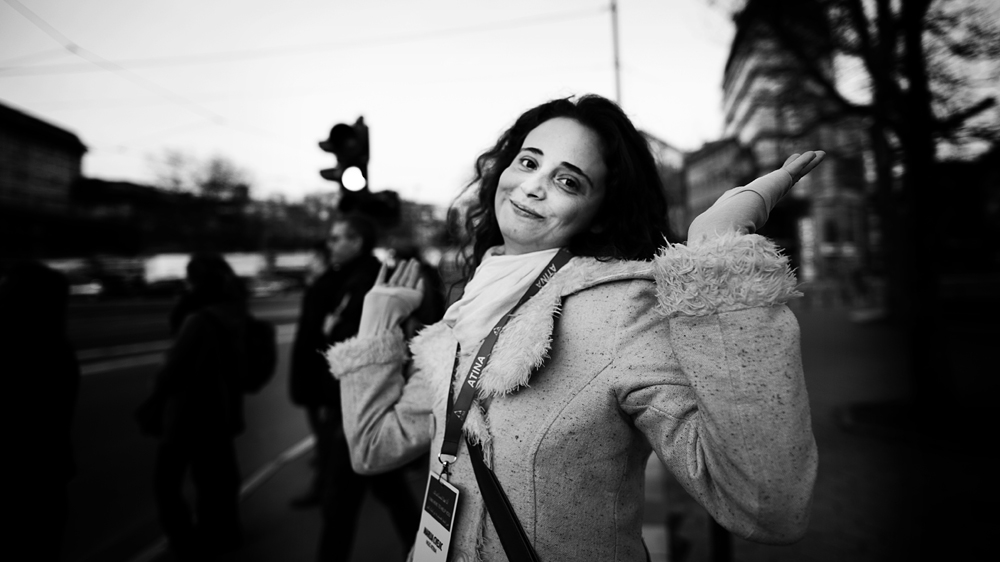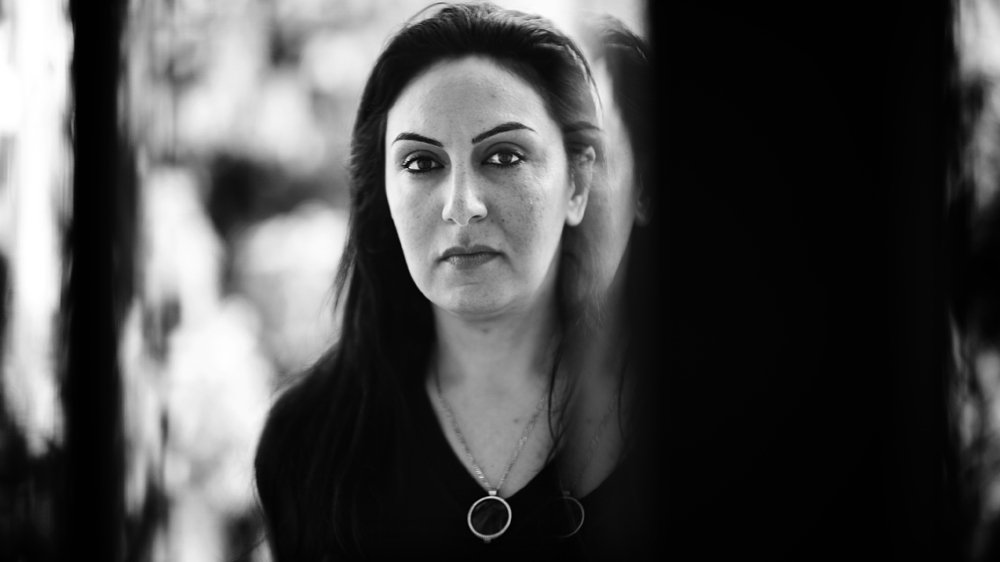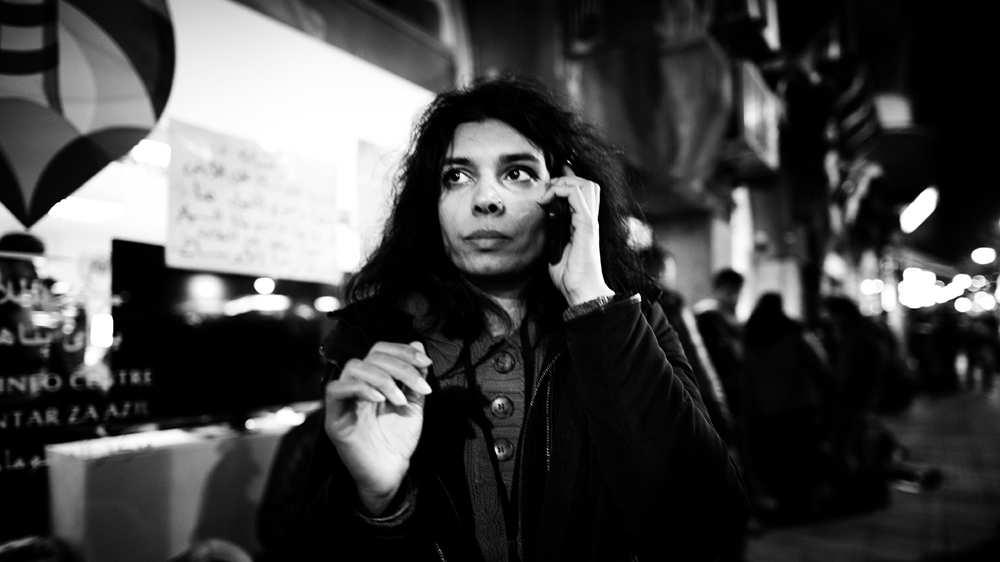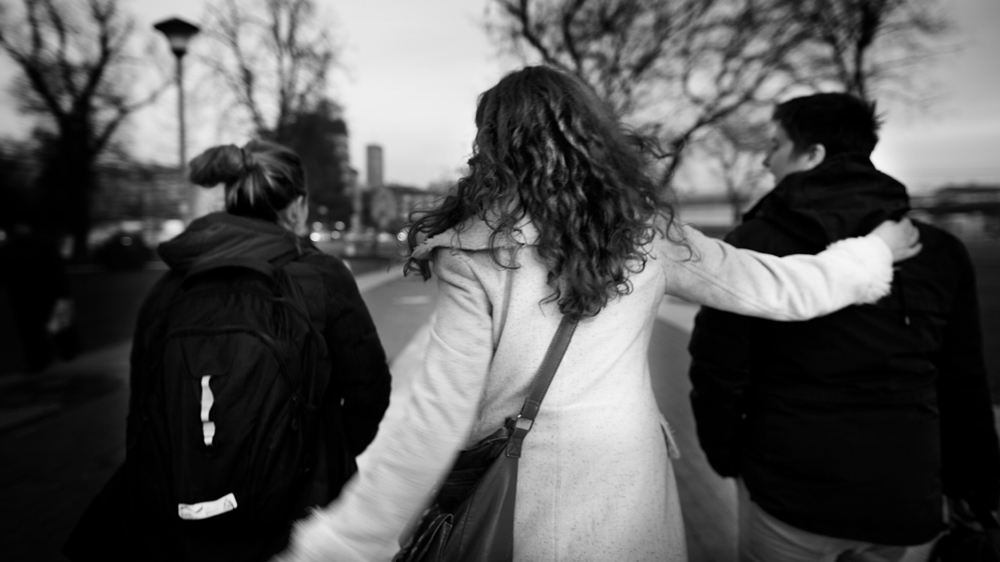Hotline: +381 61 63 84 071
The women helping refugees in Serbia

Women in Serbia share their stories about helping refugees as many recall being displaced themselves.
Marija Cvejic - 'Sometimes you can help, sometimes you can't'

"I have an aunt who often says to me: 'What are you doing with those refugees? These people shouldn't be here!'
Every time she raises the subject, I tell her the story of a refugee I met. Or I show her a drawing an Afghan girl made of a boat and people drowning. Lately she hasn't been complaining so much any more.
I always say: 'We are refugees, too'. I was 10 years old when there was war in Kosovo. I myself lived in Serbia, but all of my family lived in Kosovo. Some family members were killed, others fled. So I know what it is.
I used to work with survivors of human trafficking, but last year I started working with refugees in the transit camps. We go there as a team, we ask them how they are, start up a conversation. After a while, some of them open up.
For me it was a logical step to start helping refugees. Seeing so much suffering on the television, I couldn't bear not to do anything.
Three weeks ago, I met a Yazidi woman from Sinjar. She and her seven children were captured as sex slaves by the Islamic State of Iraq and the Levant [ISIL] group. She managed to escape with three of her children, but she had to leave four of them behind. She was pregnant as a result of rape. She was out in the rain, crying.
Once she started telling me her story, she just couldn't stop. She told me everything: How they killed her husband and father, how they took all the women and children and used them as slaves.
We arranged with the UN's refugee agency for somebody to escort her during the rest of her journey. Three days ago, I heard that she had safely arrived in Germany, where her sister lives.
And then there was this 17-year-old Afghan boy who was taken to the hospital because he had a serious wound. His two teenage friends promised they would wait for him - and they did, for three whole weeks, without knowing if he ever would come back. How they cried and hugged each other when he finally returned. This really touched me. In spite of the situation, these boys still held up the values of friendship and loyalty.
The refugee crisis is something you can't fix. Sometimes you can help, sometimes you can't. But I give the best of myself.''
Rima al-Shami - 'I have seen the war myself'

"I understand the pain that refugees feel because I have seen the war myself. I am from Damascus and my family still lives there.
I am a legal migrant; I was able to come to Serbia because my ex-husband is half Serbian, but I still know how it feels to leave your home. I know what refugees are running from. And I know what it is like to be totally alone in a strange country and to not speak the language.
It was very hard to leave my family in Syria. But one day, I was driving through Damascus with my little boy when a car in front of us exploded. That's when I decided I had to leave, for the safety of my son.
In Serbia, I first worked as a stockbroker, but my boss refused to pay me. I then took a course to become a cultural mediator, helping refugees to communicate with Serbian institutions. I wanted to do something for my fellow countrymen. This was a turnaround in my life. As a stockbroker, I worked for the very rich; as a cultural mediator, I worked among people who lost everything.
I started as a volunteer, giving information to refugees at the Hungarian border. Now I work at the Serbian transit camps of Presovo and Sid. I approach people to see what they need. When they hear I am from Syria, they are often glad to talk to me.
Because I understand their culture, refugees tell me things they wouldn't tell other people. One man from Iraq took me aside and told me he was sexually abused by three Hungarian police officers for 15 days. Another man from Syria told me how he was forced to witness his friends being tortured while he was captured by ISIL. He was a big guy, but he was crying like a child. He couldn't live with what he had seen.
I have heard many stories of desperate people. Some of them went as far as to sell their kidneys to pay the smugglers.
I try to make them feel that I care. Many people tend to think that refugees are uncivilised. The media pictures them as animals. But really, they once had a life.''
Marijana Savic - 'I am talking about empowering women'

"The first time I saw great numbers of refugees making their way through Serbian cornfields, I was deeply shocked. In their eyes, I saw their hopelessness. It made me cry - and I don't cry easily.
Twenty years ago, there was a war going on in my own country, which was then called Yugoslavia. I witnessed the horror and the suffering of people in a war zone. I remember being so angry with people who didn't understand what was going on here. We still live with the consequences of the war. So I really feel for the refugees who are now coming to Serbia.
We, a group of feminist activists, set up the NGO Atina 12 years ago, in the wake of the Yugoslav wars, to provide adequate help for the growing number of victims of human trafficking. But when we saw the refugees coming, we decided we had to do something about this problem, as well. We now have teams visiting the transit camps to offer help. We also provide aid and support at our office in Belgrade.
We are especially concerned about women and children. Everybody is always talking to the men, because they are the head of the family. The women remain in the background, invisible. Nobody is addressing their needs.
We know that woman refugees deal with a lot of violence and sexual abuse. They are forced to have 'survival sex' with smugglers, they are robbed and molested, they become victims of human trafficking. But they don't talk about it.
There are a lot of gangs operating between Macedonia and Serbia, preying on the most vulnerable refugees. I know of two Afghan girls who got raped by such a gang. It only came out in the open because one gang member was killed afterwards. Otherwise, we would never have heard of it.
We witness a lot of domestic violence, too. An Afghan man was beating his mother in a registration queue and she was screaming for help. But the police didn't think it was their job to do something about it.
That's why our work is so important. We listen to these women because nobody else does.
I believe we can all make a difference in the world. What we need is a shift in people's way of thinking. I am not just talking about women's rights, I am talking about feminism. I am talking about empowering women. Because whenever there's a disaster, it's the women that suffer most.''
Saman Vjestica - 'I was thrown in the middle of all these desperate people'

"When I first started working as an interpreter at the Asylum Info Centre, it was just a job for me. My native language is Urdu, which many Afghans happen to understand. I was never involved in humanitarian work. In Pakistan, my home country, I taught English literature.
But then I found myself confronted with these people whose problems were overwhelming. And I realised I needed to be much more than an interpreter; I needed to know about immigration laws, about institutions, about medical aid.
The authorities say: 'We can handle a refugee crisis, we did it before during the Yugoslav wars.' But it's not the same thing. These people come from totally different cultures; they can't even read the road signs.
So I was thrown in the middle of all these desperate people, handling all these situations, some of which are life-threatening. What can you do when people are seriously ill, but refuse to go to a hospital because all they want is to move on?
I came to Serbia because I married a Serbian man, but I haven't forgotten where I come from. In Pakistan, I have seen Afghan refugees ever since I was a girl. Little Afghan kids going barefoot, their families selling all their belongings in order to survive. When people say that Afghans are not real refugees, it hurts me. Their country is destroyed.
The right to seek asylum is a fundamental human right. But many countries on the route are just trying to get rid of refugees and deny them this right. They don't really treat them as people.
In the case of Pakistanis, they are all called economic migrants. But you cannot automatically assume that a Pakistani is not a genuine asylum seeker. There are many groups in Pakistan that face persecution and discrimination.
I am now working around the clock. I am not getting enough sleep, and often I forget to eat. Today was my day off, but there was a case of eight young Afghans who were threatened with deportation. So I spent three hours in the police station with them.
Before I started working here, I had no idea how much this work would mean to me. I never knew I could be so committed.''
Ana Radovic - 'I see a lot of sadness'

"When I was 19, I came across a two-month-old stray puppy in the street. I took it home and I suddenly found myself caring for this helpless little animal that was totally dependent on me.
It may sound ridiculous, but this experience changed me. It changed me into somebody who wants to help vulnerable people.
I first started working as a volunteer with Roma children. And then all these refugees started coming to Serbia.
I deeply sympathise with them, whether they are refugees or economic migrants. I feel that when people are suffering, we all should do something. So I applied for a volunteer job at the Asylum Info Centre here in the middle of Belgrade.
The first three months, I worked outside with a team in parks where many refugees were stranded. We gave them information and listened to their stories to see if there was anything we could do.
Now, I work inside the Info Centre. Refugees come here with all kinds of questions and problems. Some need help with their papers, some need legal or medical aid, others need practical things like blankets or backpacks. I listen to them, I give them tea, I try to make them laugh, to make a small part of their day a bit better.
Sometimes we can really make a difference. There was this young Moroccan who was robbed and so badly beaten up by a criminal gang in Macedonia that he couldn't walk any more. We were able to arrange a wheelchair for him and took him to the police station so he could register. He was so happy to finally get help that he cried.
I now work at the Info Centre three or four days a week. Some people react negatively to what I do. Often, they are just badly informed - they have no idea what refugees go through.
I see a lot of sadness, but I am used to that because I also work with Roma kids. This is life, and yes, it's bad. All I can do is try to make it better by being there.''
The original text can be read on the follow link:
http://www.aljazeera.com/indepth/features/2016/03/women-helping-refugees...












 FACEBOOK
FACEBOOK TWITTER
TWITTER YOUTUBE
YOUTUBE